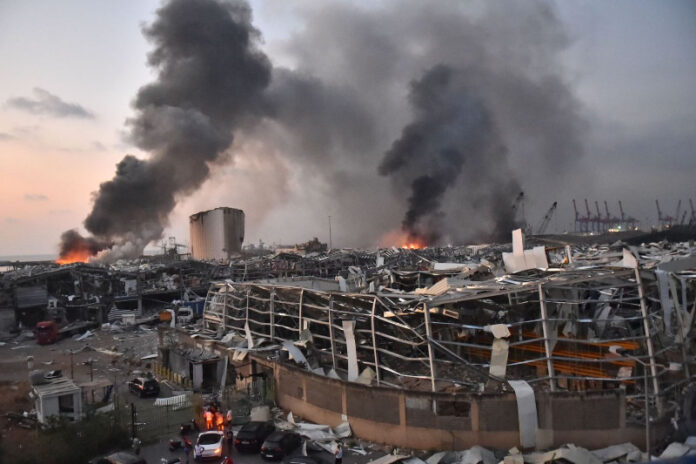
Lebanon’s justice minister quit on Monday in the third cabinet resignation since a deadly blast blamed on state negligence ripped through the capital, a ministry official told AFP.
Marie Claude Najem, who was heckled by protesters in a damaged Beirut street two days after the explosion, submitted her resignation to Prime Minister Hassan Diab, whose government was set to meet later in the day to discuss the August 4 disaster.
Several MPs also quit and local media reported Diab was mulling announcing the entire government’s resignation, a day after protesters briefly occupied and ransacked government ministries.
Hundreds gathered again in and around Martyrs’ Square, a short walk from the port where the devastating explosion occurred, killing at least 158 people and injuring a staggering 6,000, many bloodied by flying glass.
“Those who died paid the price of a state that doesn’t care about anything except power and money,” said protester Tamara, 23, whose friend Rawan, 20, was killed in the blast.
“It’s not enough that ministers resign,” said her friend Michel.
“Those who put the explosives there must be held accountable. We want an international tribunal to tell us who killed (Rawan).”
Police later fired tear gas in an attempt to disperse protesters who hurled stones and let off fireworks near a street leading to parliament, AFP correspondents said.
Many wore helmets and gas masks, some wielded makeshift shields and others rushed to pick up smouldering tear gas shells and threw them back towards police.
– ‘My government did this’ –
While it is not known what started the fire that set off a huge stockpile of ammonium nitrate, protesters say the disaster could not have happened without the corruption and incompetence that have come to define Lebanon’s ruling class.
A picture went viral online showing the city’s devastated port, with a low wall in the foreground bearing the spray-painted message: “My government did this.”
The disaster has revived anger at a ruling class seen as living in luxury while millions endure job losses, deepening poverty, power blackouts and garbage mountains piling up in the streets.
The Lebanese army had “fading hopes” of finding any more survivors, Colonel Roger Khoury told reporters Sunday.
Human Rights Watch’s Lebanon researcher Aya Majzoub said some security forces had indiscriminately fired tear gas and rubber bullets at protesters.
“Instead of deploying the army to help residents clear rubble from their homes, businesses, and communities, the Lebanese authorities chose to deploy them and other security forces against protesters.”
Saturday’s violence injured 65 people, the Lebanese Red Cross reported, while lawyers supporting protesters said security forces made 20 arrests.
The August 4 explosion came as Lebanon was already reeling from an economic crisis that has seen its currency collapse, plunging swathes of its population into poverty, and struggling with a spike in coronavirus cases.
(AFP)

